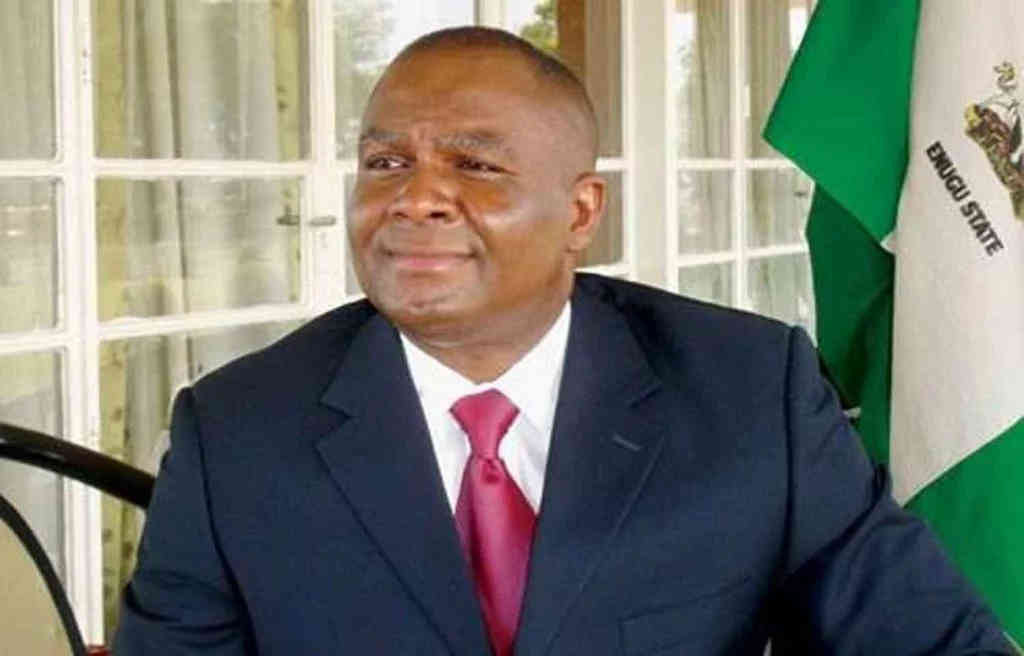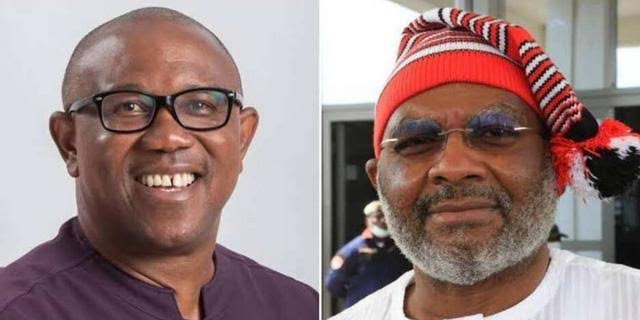A Federal High Court in Abuja overturned the expulsion of former Enugu State Governor Chimaroke Nnamani from the Peoples Democratic Party (PDP) for alleged anti-party activities.
According to a ruling by Justice James Omotosho, Nnamani was not given a fair hearing in accordance with the PDP’s constitution.
Read Also INEC Swiftly closes case in Atiku’s petition with only one witness
In accordance with Article 57 of the PDP’s constitution, only the National Executive Council (NEC) has the authority to convene a disciplinary committee, not the National Working Committee (NWC), which made the decision.
The judge stated that the party’s constitution stipulated that the NEC possessed the authority to take disciplinary action against any erring governor, deputy governor, or serving member of the National Assembly.
Pay Attention To Breaking: Former Nigerian Minister is dead
Nnamani, who represented Enugu East Senatorial District in the 9th Senate, lost his re-election bid on February 25 to Labour Party candidate Kelvin Chukwu, according to the News Agency of Nigeria (NAN).
At its 566th meeting on February 10, the PDP NWC expelled the former senator over allegations of anti-party activities.
PDP expels Chimaroke Nnamani, 6 others
On January 20, he was suspended before subsequently being expelled.
Nnamani allegedly campaigned for the All Progressives Congress (APC) presidential candidate, Sen. Bola Tinubu, against the PDP presidential candidate, Alhaji Atiku Abubakar.
As per NAN, the Independent National Electoral Commission (INEC) declared Tinubu the winner of the February 25 presidential election after he received the most votes, and he was sworn in as Nigeria’s president on May 29.
In a suit marked FHC/ABJ/CS/163/23 filed on February 6, however, Nnamani alleged that INEC, the PDP national chairman, and the NWC had violated his constitutional right to a fair hearing.
In the initial summons, the plaintiff questioned whether he could be suspended without being afforded his constitutional right to a fair hearing.
He wanted the court to determine, based on the provisions of the party’s Article 57, that the NWC’s decision to suspend him on January 20 was not invalid.
Pay attention to Atiku’s Aide, Bwala Mocks INEC For Failing To Provide Witnesses After 10 Days Break
Therefore, he petitioned the court to rule that, pursuant to the party’s constitution, the respondents did not conduct a valid disciplinary action against him prior to his suspension.
Nnamani argued that in addition to being a senator, he had also served as governor of Enugu State for two terms.
He claimed he was neither informed of any complaint against him nor afforded a fair hearing.
In a counter-affidavit and a preliminary objection, however, the respondents requested dismissal of the lawsuit.
They argued that Nnamani campaigned for another political party while he was a PDP member.
Contrary to his argument, they stated that the party had the authority to suspend him for engaging in anti-party activities.
They also argued that the court lacked the authority to decide on the issues because they involved the party’s internal affairs.
Justice Omotosho stated that although the Supreme Court held that the issue of party membership, etc. was within the party’s jurisdiction and a no-go area for the courts, Section 46(2) of the 1999 Constitution vested the court with the authority to hear claims of violation of individual rights.
He used previous cases to support his conclusion.
“This court will not delve into the internal affairs of a party, but will instead determine whether the plaintiff’s fundamental rights have been violated,” he said.
Despite the fact that these rights are not absolute, Chapter 4 of the Nigerian Constitution of 1999 protects them, and the African Charter on the Rights of the People also contains provisions for fundamental rights, he stated.
The judge agreed that a member of a political party must adhere to its rules and regulations; however, he stated that the court would only intervene if the party violated its own rules and regulations.
He remarked that Articles 4 and 5 of the PDP stipulated members’ right to a fair hearing.
According to him, a fair hearing is providing equal opportunity to all parties, and once a party has received a fair hearing, he or she cannot file a complaint.
“However, the plaintiff’s complaint is that he was not given a fair hearing,” he said, citing Article 57 of the party’s constitution.
“The law makes it clear that specific provisions take precedence over general ones,” he said.
At its 566th meeting, the NWC considered all of the allegations against Nnamani and approved his one-month suspension, according to the available evidence before the court, he stated.
In addition, the judge noted that the NWC expelled him on February 10 via a press release.
According to Omotosho, this was a flagrant violation of the party’s constitution, which rendered all actions null and void.
He stated that the court was convinced the plaintiff had proven his case against the defendants.
In consequence, Justice Omotosho issued an order nullifying the February 10 decision of the PDP NWC to expel the former lawmaker.(NAN)
On Monday, a Federal High Court in Abuja reversed the expulsion of former Enugu State Governor Chimaroke Nnamani from the Peoples Democratic Party (PDP) for alleged anti-party activities.
According to a ruling by Justice James Omotosho, Nnamani was not given a fair hearing in accordance with the PDP’s constitution.
According to Article 57 of the PDP’s constitution, only the National Executive Council (NEC) has the authority to convene a disciplinary committee, not the National Working Committee (NWC), which made the decision.
The judge stated that the party’s constitution stipulated that the NEC possessed the authority to take disciplinary action against any erring governor, deputy governor, or serving member of the National Assembly.
Nnamani, who represented Enugu East Senatorial District in the 9th Senate, lost his re-election bid on February 25 to Labour Party candidate Kelvin Chukwu, according to the News Agency of Nigeria (NAN).
At its 566th meeting on February 10, the PDP NWC expelled the former senator over allegations of anti-party activities.
On January 20, he was suspended before subsequently being expelled.
Nnamani allegedly campaigned for the All Progressives Congress (APC) presidential candidate, Sen. Bola Tinubu, against the PDP presidential candidate, Alhaji Atiku Abubakar.
According to NAN, the Independent National Electoral Commission (INEC) declared Tinubu the winner of the February 25 presidential election after he received the most votes, and he was sworn in as Nigeria’s president on May 29.
In a suit marked FHC/ABJ/CS/163/23 filed on February 6, however, Nnamani alleged that INEC, the PDP national chairman, and the NWC had violated his constitutional right to a fair hearing.
In the initial summons, the plaintiff questioned whether he could be suspended without being afforded his constitutional right to a fair hearing.
He wanted the court to determine, based on the provisions of the party’s Article 57, that the NWC’s decision to suspend him on January 20 was not invalid.
Therefore, he petitioned the court to rule that, pursuant to the party’s constitution, the respondents did not conduct a valid disciplinary action against him prior to his suspension.
Nnamani argued that in addition to being a senator, he had also served as governor of Enugu State for two terms.
He claimed he was neither informed of any complaint against him nor afforded a fair hearing.
In a counter-affidavit and a preliminary objection, however, the respondents requested dismissal of the lawsuit.
They argued that Nnamani campaigned for another political party while he was a PDP member.
Contrary to his argument, they stated that the party had the authority to suspend him for engaging in anti-party activities.
They also argued that the court lacked the authority to decide on the issues because they involved the party’s internal affairs.
Justice Omotosho stated that although the Supreme Court held that the issue of party membership, etc. was within the party’s jurisdiction and a no-go area for the courts, Section 46(2) of the 1999 Constitution vested the court with the authority to hear claims of violation of individual rights.
He used previous cases to support his conclusion.
“This court will not delve into the internal affairs of a party, but will instead determine whether the plaintiff’s fundamental rights have been violated,” he said.
Despite the fact that these rights are not absolute, Chapter 4 of the Nigerian Constitution of 1999 protects them, and the African Charter on the Rights of the People also contains provisions for fundamental rights, he stated.
The judge agreed that a member of a political party must adhere to its rules and regulations; however, he stated that the court would only intervene if the party violated its own rules and regulations.
He remarked that Articles 4 and 5 of the PDP stipulated members’ right to a fair hearing.
According to him, a fair hearing is providing equal opportunity to all parties, and once a party has received a fair hearing, he or she cannot file a complaint.
“However, the plaintiff’s complaint is that he was not given a fair hearing,” he said, citing Article 57 of the party’s constitution.
“The law makes it clear that specific provisions take precedence over general ones,” he said.
At its 566th meeting, the NWC considered all of the allegations against Nnamani and approved his one-month suspension, according to the available evidence before the court, he stated.
In addition, the judge noted that the NWC expelled him on February 10 via a press release.
According to Omotosho, this was a flagrant violation of the party’s constitution, which rendered all actions null and void.
He stated that the court was convinced the plaintiff had proven his case against the defendants.
In consequence, Justice Omotosho issued an order nullifying the February 10 decision of the PDP NWC to expel the former lawmaker.
(NAN)









